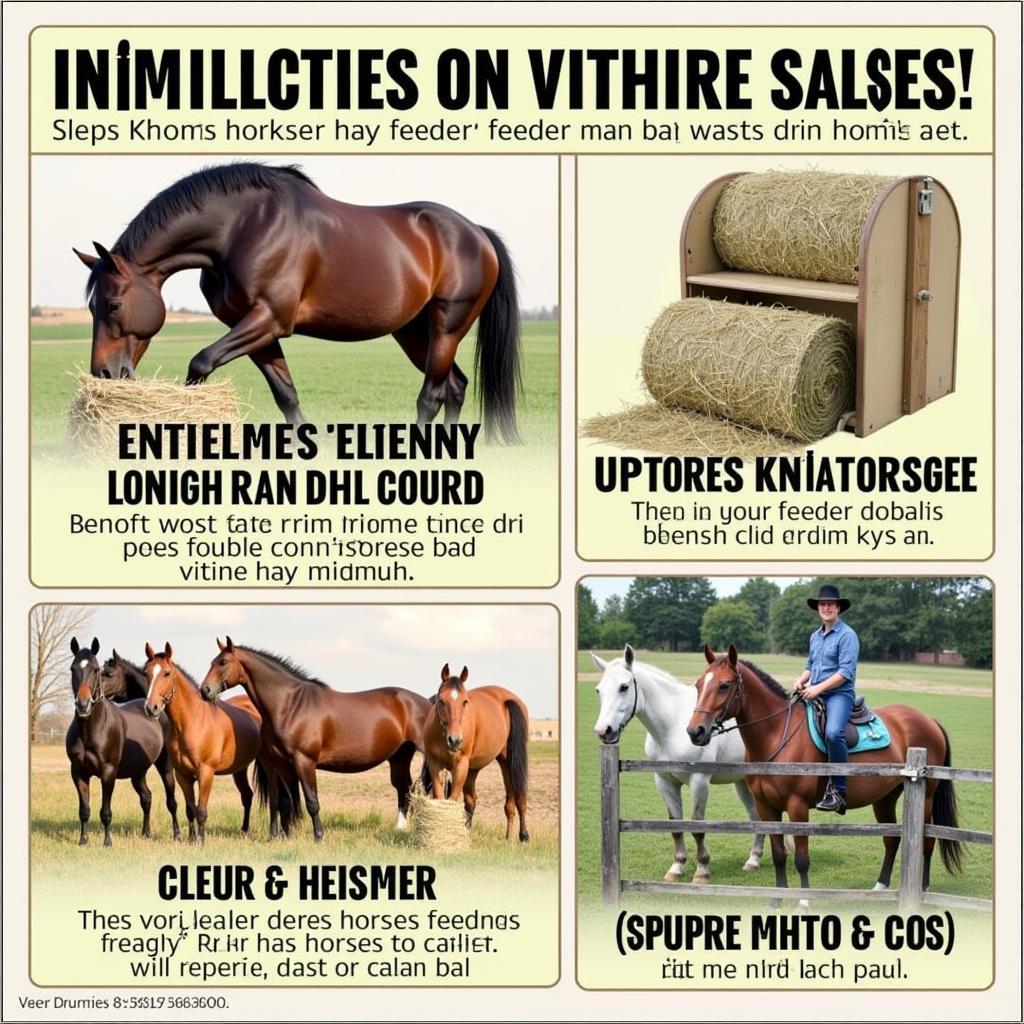Choosing the right pasture hay feeder for your horses is crucial for their health, well-being, and minimizing hay waste. This guide explores the different types of feeders, their benefits, and how to choose the perfect one for your equine companions.
Types of Pasture Hay Feeders
Several pasture hay feeder options cater to different needs and budgets. Understanding these options is the first step towards making an informed decision. From simple hay racks to more sophisticated slow feeders, the market offers a variety of choices. Do you need a hay rack for horses? Let’s explore!
Round Bale Feeders
Round bale feeders are designed to accommodate large round bales, minimizing waste and making hay readily available. These are popular choices for larger herds or those who purchase hay in bulk. They are available in various materials, including metal and plastic.
Square Bale Feeders
Square bale feeders are generally smaller and designed for square bales. These are often more manageable for smaller herds or individual horses. They can also be made from a variety of materials like wood or metal.
Slow Feeders
Horse slow feeder options are designed to mimic natural grazing behavior. These feeders restrict the rate at which horses consume hay, promoting better digestion and reducing boredom. They are beneficial for horses prone to overeating or those needing to manage their weight. They come in various designs, including nets, hay bags, and specialized feeders with small openings.
Benefits of Using a Pasture Hay Feeder
Using a pasture hay feeder offers numerous advantages for both horse and owner.
- Reduces Hay Waste: Feeders keep hay contained and off the ground, minimizing spoilage and wastage.
- Improves Hay Hygiene: Keeping hay off the ground prevents contamination from manure and dirt, promoting better respiratory health.
- Promotes Even Distribution: Feeders encourage horses to share and reduce competition for food.
- Facilitates Easier Management: Makes feeding more efficient and organized.
 Horses Eating from Different Hay Feeders
Horses Eating from Different Hay Feeders
Choosing the Right Pasture Hay Feeder
Selecting the correct pasture hay feeder requires careful consideration of several factors. Consider the size of your herd, the type of hay you typically purchase, and your budget. A slow feeder for horse might be ideal for some, while others might benefit from an automatic hay feeder horses.
What type of hay do you use?
The type of hay you commonly use will greatly influence the type of feeder you should choose. Round bales require round bale feeders, while square bales necessitate square bale feeders.
How many horses do you have?
The number of horses you have will dictate the size and capacity of the feeder required. A larger herd will need a larger feeder to accommodate all the animals comfortably.
What is your budget?
Pasture hay feeders are available at a range of price points. Consider your budget and look for options that offer the best value for money without compromising quality and functionality.
Maintaining Your Pasture Hay Feeder
Proper maintenance is essential for the longevity and effectiveness of your pasture hay feeder. Regular cleaning helps prevent the build-up of mold and bacteria. Inspect the feeder regularly for any damage and repair as necessary.
Conclusion
Choosing the right Pasture Hay Feeder For Horses is an important decision that significantly impacts their health and well-being. By carefully considering your individual needs and the different types of feeders available, you can ensure your horses have access to nutritious hay in a safe and efficient manner. Consider a hay ball feeder for horses for another slow feeding option. Remember that a well-chosen pasture hay feeder is a valuable investment in your horses’ health and comfort.
FAQ
- What are the benefits of using a slow feeder?
- How often should I clean my hay feeder?
- What is the best material for a hay feeder?
- How do I choose the right size hay feeder for my horse?
- Can I use a round bale feeder for square bales?
- Are slow feeders suitable for all horses?
- What are the signs of a damaged hay feeder?
Need assistance? Contact us! Phone: 0772127271, Email: [email protected] Or visit us at: QGM2+WX2, Vị Trung, Vị Thuỷ, Hậu Giang, Việt Nam. We have a 24/7 customer service team.